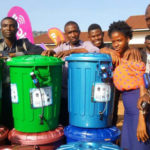By Jane Brinton
In April 2018, I traveled to Puerto Rico from Ecuador with Andres Morales, our Waterbearer Ambassador and Amazon guide, who has accompanied us on many trips in Ecuador and Latin America.
In San Juan, we were met by the Black Flag Search and Rescue team, which was founded by Jana Stone during the Standing Rock protest of the Dakota Access Pipeline. After Hurricanes Irma and Maria devasted the island last September, Jana Stone, Eddie Guárico Aviles, and Alex Cohen came to Puerto Rico and have been volunteering full time for the past 7 months, supported only through donations to their cause, and water filters provided by The Waterbearers.
Upon arrival, we discovered that the FEMA warehouses had shut down, and relief agencies had gone home too. But our band of Black Flag angels continued to drive the back streets and treacherous mountain roads where mudslides are a weekly occurrence following leads of people still in need from the housebound elderly to a paraplegic teenager.
Andres and I spent 3 days with these remarkable people, Jana, Eddie, and Alex, in their leased pickup truck, which they had to return April 21, trying to deliver as many supplies as they could including mattresses donated by Sears, portable solar panels and of course, The Waterbearers provided Sawyer filters and the critical training on their proper use.
We ventured into the mountains above Utuado where two women, mother, and daughter live side-by-side next to a huge mudslide that continually washes away chunks of road. This small neighborhood was completely cut-off after the hurricane. The first people they saw were soldiers who airlifted food and water to them. Now 7 months later, 56-year old Judith Omaña told us she still has no electricity or clean water to drink and her roof leaks buckets! Inside her mother’s house, 3 large pots of water were boiling on the stove. The hose outside is used for cleaning and washing clothes but it is so heavily chlorinated that it leaves large white bleach patches on her clothes. We left them with another water filter and trained them on the proper use of the filters, so they knew how best to optimize them. We also left them with a portable solar panel with 2 light bulbs placed in the kitchen, as they had had no light to cook with for 7 months.
Back in Lares, the Black Flag team live and work from an abandoned restaurant, providing storage and shelter for volunteers. Tiffany Theriot who runs the facility has been there since the hurricane, and at one time was feeding 500-700 people a day throughhttps://cajuncommissary.com. There was no running water while we were there. Following heavy rains the water source becomes contaminated and the authorities shut off the supply. This forces locals to purchase bottled water for drinking, and to catch rainwater. Part of our program is to encourage the latter. Frequent rain will quickly provide enough water to harness and with the Sawyer system they can filter out bacteria and have clean water to drink. This is actually safer than drinking the tap water, which when it is turned on is heavily chlorinated and often contaminated with industrial waste.
In Carolina, we did a water demonstration for 20+ women in the community. We believe in empowering women wherever we go by having them assemble the filter and to learn how to take care of it, so they, in turn, can provide clean safe water for their families. We delivered 12 filters and buckets at this location and asked them to share a filter system with their neighbor. This community had previously been bypassed by some of the FEMA handouts.
Next, we drove to Loíza on the northeastern coast, north of Canóvanas. There we met Will who lives in a tiny house without electricity. His dream was to return to Puerto Rico to grow plantains on this property, but during the hurricane, he lost his crops. We gave him a solar light and a water filter. To demonstrate the effectiveness of the filter, we found a discarded Coca-Cola bottle and scooped up rainwater from a puddle that had all kinds of things swimming around in it, we attached the filter directly to the bottle and we all drank from it. One of the most effective ways we use in demonstrating the system is to drink the water ourselves, which instills confidence and trust.
The need is always greatest at the beginning of a natural disaster, but slowly aid leaves and the press stops reporting. What struck me was seeing tourists disembarking a cruise ship in old San Juan where even fellow Puerto Ricans we method no idea there were people still on the island without power and water. Just because it’s not in the news, it doesn’t mean the problems have gone away.
I will be forever grateful to the team of Black Flag for their dedication to helping others. It’s important to support these people on the ground who are doing the real work.
Andres and I left San Juan the morning of April 18, within minutes after takeoff we learned of the complete island blackout. While I was grateful to be on my way back to Ecuador, I was saddened to think of the beautiful people I had met in Puerto Rico and what they still have to endure.
Special thanks to JetBlue who provided my air travel to Puerto Rico.



Leave a Reply